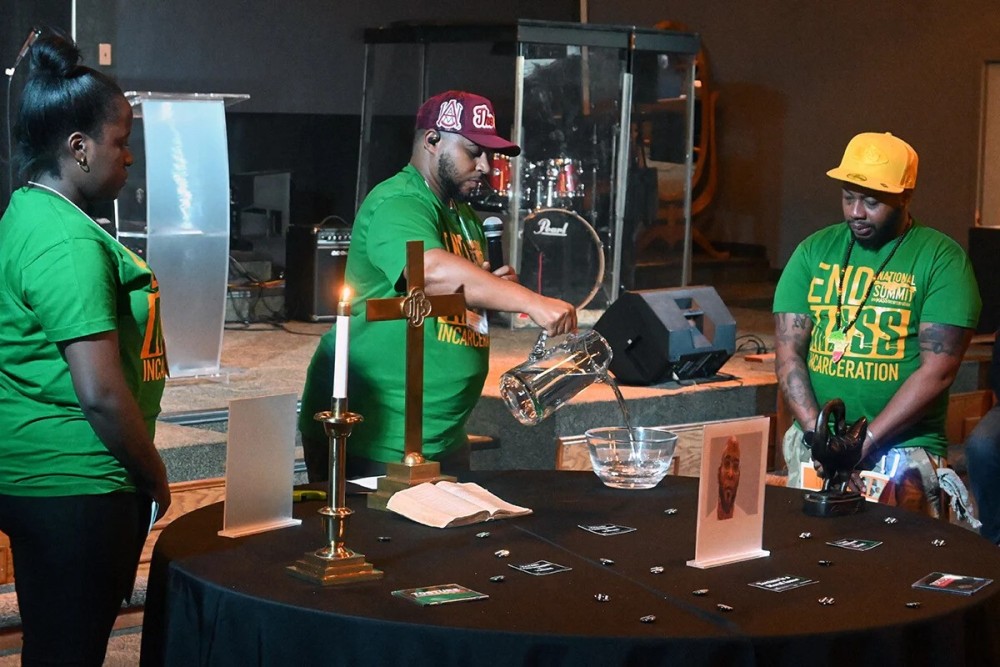National UMC summit spotlights mass incarceration, redemption

A libation service is performed in honor of the late Marcellus Williams during the final day of the biennial National Summit on Mass Incarceration and Social Justice on October 5 in Kansas City, Missouri. (Photo by Jim Patterson, UM News)
More than 50 participants from six annual conferences in the United Methodist Church convened earlier this month to network and learn about the issues around mass incarceration at the biennial National Summit on Mass Incarceration and Social Justice in Kansas City, Missouri.
At the summit—organized by the UMC’s Strengthening the Black Church for the 21st Century and other UM ministries—participants heard from people who are frustrated by the US justice system, especially its emphasis on imprisonment as the answer to crime.
“The United States incarcerates more people, in both absolute numbers and per capita, than any other nation in the world,” the American Civil Liberties Union reports. “Since 1970, the number of incarcerated people has increased sevenfold to 2.3 million in jail and prison today, far outpacing population growth and crime.”
One of every three Black males will go to prison during their lifetime, again according to the ACLU.
At the Kansas City summit, story after story of the heartaches caused by mass incarceration in the United States were leavened by tales of redemption—former inmates now thriving in the outside world. Participants also heard from Stephen Barbee, an All-American college football player who lost his freedom because of substance use, and Missouri state Sen. Barbara Anne Washington, who as a 13-year-old, used a knife to defend herself from a schoolboy, and ended up in jail after he died.
Overhanging the summit was the case of Marcellus Williams, a convicted murderer who was put to death on September 24 in Missouri, while doubts about his guilt persisted. Williams served as a kind of patron saint for the summit.
According to summit speaker Brian Roper, founder and CEO of One Life Second Chance Inc. in Kansas City, which tries to help formerly incarcerated people become successful members of the community after their release, 83 percent of people who leave prison will return.
“If we say the system’s working—working for who?” Roper asked. “Well, there’s some investors who are tied to the system that love the fact that we have the largest incarcerated population in the world.”
Nicole Price, the CEO of Lively Paradox, a company that coaches people and organizations on leadership, expanded on the ways capitalism supports mass incarceration.
“If you think about Securus Technologies, I love that they exist,” Price said. They make it possible for me to do a video call with my nephews who are in prison. But, last year, they made $700 million. So, is it beneficial to them for there to be less people in prison? Not at all, not at all. They make more money when there are more people in prison.”
Likewise, companies that sell uniforms to prisons and others who benefit from work-release programs do better the greater the prison population, she said.
“We have to understand how all of these things work together,” she said. “Because even though we wouldn’t operate that way, many people do.
Sam Hough, associate pastor at Crossroads United Methodist Church, in Compton, California, explained that there are more than 40,000 restrictions around the country that make life difficult for people who leave prison—including, bans on buying a house, renting an apartment, participating in homeowners’ associations, and getting professional licenses.
“How many are aware of the collateral consequences of criminal conviction?” asked Hough, who has done time in prison.
Hough told a story of a friend who learned how to make lenses for glasses and did it for years while in prison. When he got out, he could not get a license to work in that field because of his criminal record.
The summit ended with a ceremony to honor Williams.
“We thought it’d be appropriate to remember brother Marcellus Williams, who was executed right here in the state of Missouri,” said Michael L. Bowie, Jr, national executive director of Strengthening the Black Church for the 21st Century. He added that Williams’s execution by lethal injection “was a profound miscarriage of justice and a grievous moral failure.”
Emanuel Cleaver III, senior pastor of St. James United Methodist Church in Kansas City, said that Williams was “held captive by a system that needs to be changed.”
“In Luke 4:18, Jesus began his earthly ministry by reading the words of the prophet Isaiah on a scroll in the synagogue, proclaiming to set the captives free,” Cleaver said. “Then he began his ministry of setting people free from illness, setting people free from emotional harm, setting people free from sin.”
“That’s why we’re here today, because we are followers of that teaching to work, to set free from unjust sentencing, free from wrongful convictions.” —UM News





